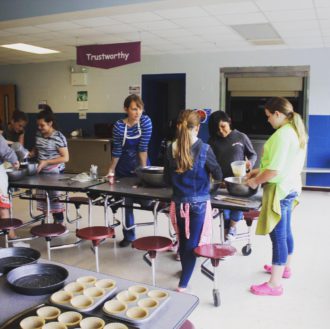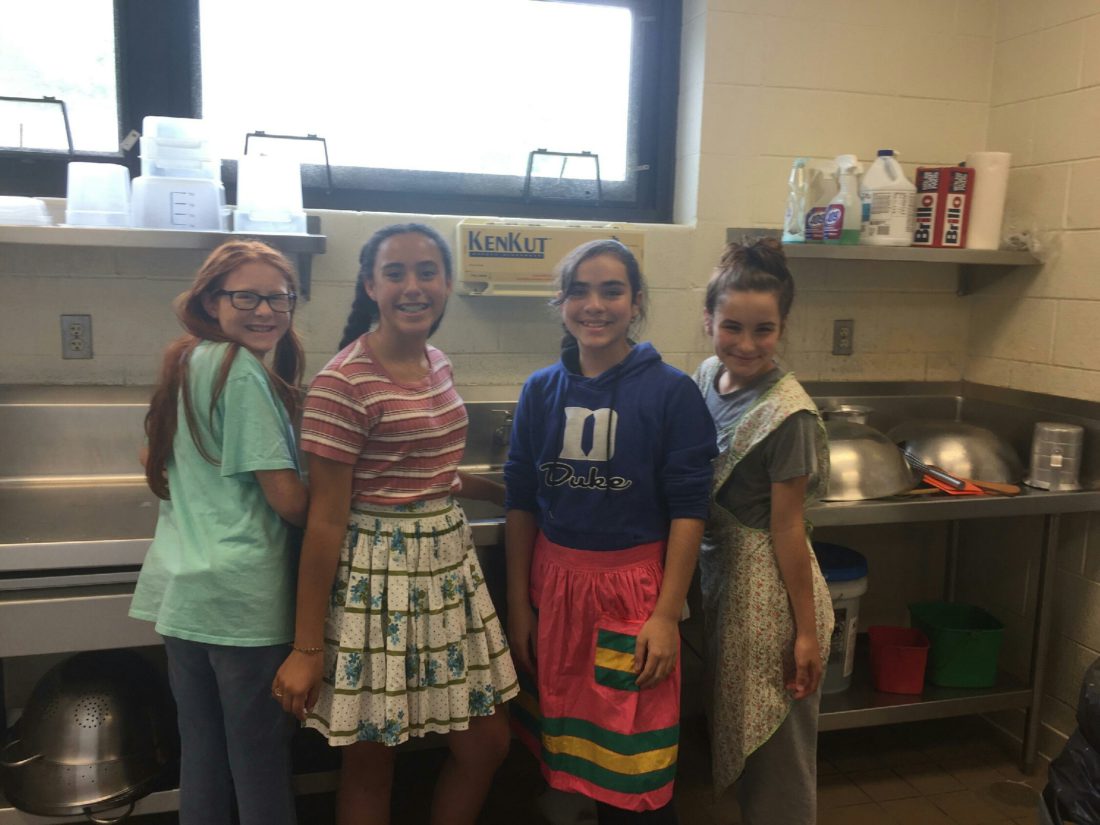By the third week of June, most public schools in Western North Carolina are already joyously vacated for summer break. But on a particularly warm, rainy Monday this summer, the cafeteria at Madison Middle School was humming with the din of a few dozen young teen girls eating lunch.
The girls are students in Madison County’s Partnership for Appalachian Girls’ Education program, which just completed its 10th season in July. The meal they sat down to that day was not your typical school cafeteria fare. The plastic trays were heaped with veggie lasagna and salad made with fresh greens, squash, zucchini, peppers and other vegetables grown just a mile from the school at Highgate Farm. On the side were generous chunks of richly textured whole-grain focaccia baked in a wood-fired brick oven by Walnut Schoolhouse artisan baker Brennan Johnson just down the road in Marshall.
PAGE’s mission is to expand opportunities for girls in rural Appalachia — an average of about 75 students each year — through a six-week middle-school summer program incorporating digital learning, literacy and leadership projects as well as school-year mentoring, college counseling and internships for high school girls. Participants are picked up and dropped off at their homes throughout Madison County each day to alleviate the transportation issues that are common among the small, far-flung, mountain-locked communities. And across these efforts, the program focuses on local foodways and addressing food insecurity among its participants.
“We have girls in our program who experience food insecurity in their families, so we knew we needed to have a very strong breakfast and very strong lunch,” says PAGE Executive Director and founder Deborah Hicks-Rogoff, who is also a research scholar in the Social Science Research Institute at Duke University and author of the book The Road Out: A Teacher’s Odyssey in Poor America.
“And we really felt that to make everything as healthy as possible, we would try our best to do a farm-to-table food program,” she continues. “Then we were able to get grant funding to ramp things up, bring in a farm-to-table coordinator to provide leadership with that and evolve our partnerships with farm and bakery partners and get to the point where a great deal of our food is locally sourced. So it’s been a gradual process of increasing and deepening that part of it.”
The farm-to-table coordinator she references is retired teacher and local farmer Jeannette Kendall, who on this day joins Hicks-Rogoff in dining on the lasagna and focaccia along with the girls, who are all in middle school along, with a few high school interns. Kendall says she is very pleased with the breads she sourced this summer from Johnson for the program’s meals, including sandwich breads made with sprouted flour, flax and sunflower seeds, and oats.
“I try to provide approachable breads for the kids but also something they can see as a little bit different, more whole grains, more flavors,” says Kendall.
Old and new
Along with the healthy, locally sourced breakfasts (French toast was a favorite among the girls this summer) and lunches, PAGE participants learn about the traditions of their rural communities as well as ways the area is evolving through field trips, hands-on classes, multimedia activities and oral history projects. Many of these efforts use food as a bridge for connecting to deeper concepts.
Since its beginning, the initiative, which functions through partnerships with Duke University and the Madison County School System, as well as grants and private donations, has collaborated with local farmers, both for sourcing and as part of the curriculum. In the early years, when PAGE was based out of the old fieldstone school building in the rural Spring Creek community that now houses the Spring Creek Community Center, farmers Julie Mansfield and Carl Evans of Mountain Harvest Organics supplied the produce and brought the girls out for hands-on lessons on the land. Now that the program is based at Madison Middle School, logistical considerations brought Melissa Harwin of nearby Highgate Farm on board as a farm partner.
Harwin collaborates with Kendall to grow a range of vegetables for the program — some that have been traditionally cultivated in Madison County for generations and others that are more exotic. Harwin points to yellow crookneck squash as an example of a food that’s historically common to the area. “The folks around this region grew a limited number of vegetables in their gardens because they were saving their seeds, and many vegetables will cross,” she explains. “If you grow yellow crookneck next to zucchini, you can’t save your seed and have it come back true the following year.”
But on her farm this season, in addition to yellow crookneck, she grew a variety of colored zucchini and pattypan squash as well. “So we’re following the traditions of the region, but we’re also introducing some new and different vegetables,” she says. “I think that’s a really nice way to connect kids who, maybe their grandparents had gardens, but their parents don’t and they’re not as familiar with that, but to be able to reconnect with that on land that was used for generations for gardening and farming here in the region.”
From field to classroom
Maia Surdam, historian and co-owner of Old World Levain Bakery in Asheville, also works with PAGE as an instructor and leader of the program’s oral history component. She relishes creating opportunities to weave food into the fabric of the curriculum.
“We actually were able [this season] to integrate some of the activities the girls did on our field trips and in our classroom lessons,” she says. “Like, we visited a farm in Spring Creek and picked blueberries, and in my [afternoon class], we turned them into muffins and blueberry snack cakes and had them for breakfast the next day. So I had the girls be a part of all steps of that process and then sharing them.”

Surdam also remembers a successful pizza-making project. “We didn’t harvest any wheat or anything,” she jokes. “But we did mix the dough, and then we had [the pizza] for lunch the next day.” The school’s cafeteria workers, she notes, helped with the kitchen projects by assembling and cooking some items, like the pizza, due to the students’ limited time in the classroom.
“It was so cool because many of the girls hadn’t ever mixed dough before,” Surdam notes. “And they all love pizza, but to be able to get their hands in it and see how simple it is to do on your own was really fun.”
In trying foods that were new to them, such as Johnson’s whole-grain breads, Surdam says some of the students liked them and others weren’t as enthusiastic. But in all cases, the experiences provided food for thought and discussion.
“[It’s about] giving them an understanding about what goes into the food they eat, starting those conversations early, and hopefully those interactions will lead to them being more willing to try something — and even better, learning how to make it.”
Written reflections shared by some of the rising sixth and seventh grade girls at the end of the session show an appreciation for both the new and familiar flavor experiences. “I like the sausage biscuits because they remind me of my grandma,” writes one girl. “I like the pizzas. All the food was really good. It let me try new things. I wish we could eat something like this all year long.”
Deep listening
The oral history projects allow Surdam a unique conduit for introducing the girls to Madison County’s heritage, often with a focus on foodways. The girls identify people within the community with a story to tell, conduct interviews and produce videos of the stories. All of the oral history projects in 2018 were related to food (some of those can be viewed on the PAGE website), and this year’s were centered on the history of the Spring Creek community near Hot Springs.
The oldest narrator in this summer’s projects was 92-year-old Marvin Lowe, who attended school at the old stone Spring Creek schoolhouse all 12 years. Last year, his niece, Spring Creek cheesemaker and antique collector Lucy Lowe, was interviewed.
Surdam sees collecting the stories as a way for the young teens to hone deep listening skills and develop an understanding that every person and place — even ordinary people and small, rural towns — has an interesting story worth sharing. And as a first-generation college student from a small-town Midwestern family, she also believes PAGE’s mixed focus on local history, new businesses and young farmers has the potential to have a strong positive impact on Madison County.
“I just have a real commitment to how rural communities are changing and thinking about ways to support that transformation. My personal story is that I left [my hometown], and that often is what happens when people get educated,” she says. “But it seems that there’s potential for something different here. This is a very special place; it’s so beautiful, and there’s a lot of creativity and people doing really interesting things. I see a potential for these girls not just to get educated and inspired and leave, but to take that inspiration and figure out how to instill it in their communities and create a better future.”
For more on the Partnership for Appalachian Girls’ Education and to view the program’s 2018 oral history projects, visit pageprograms.com.



Before you comment
The comments section is here to provide a platform for civil dialogue on the issues we face together as a local community. Xpress is committed to offering this platform for all voices, but when the tone of the discussion gets nasty or strays off topic, we believe many people choose not to participate. Xpress editors are determined to moderate comments to ensure a constructive interchange is maintained. All comments judged not to be in keeping with the spirit of civil discourse will be removed and repeat violators will be banned. See here for our terms of service. Thank you for being part of this effort to promote respectful discussion.